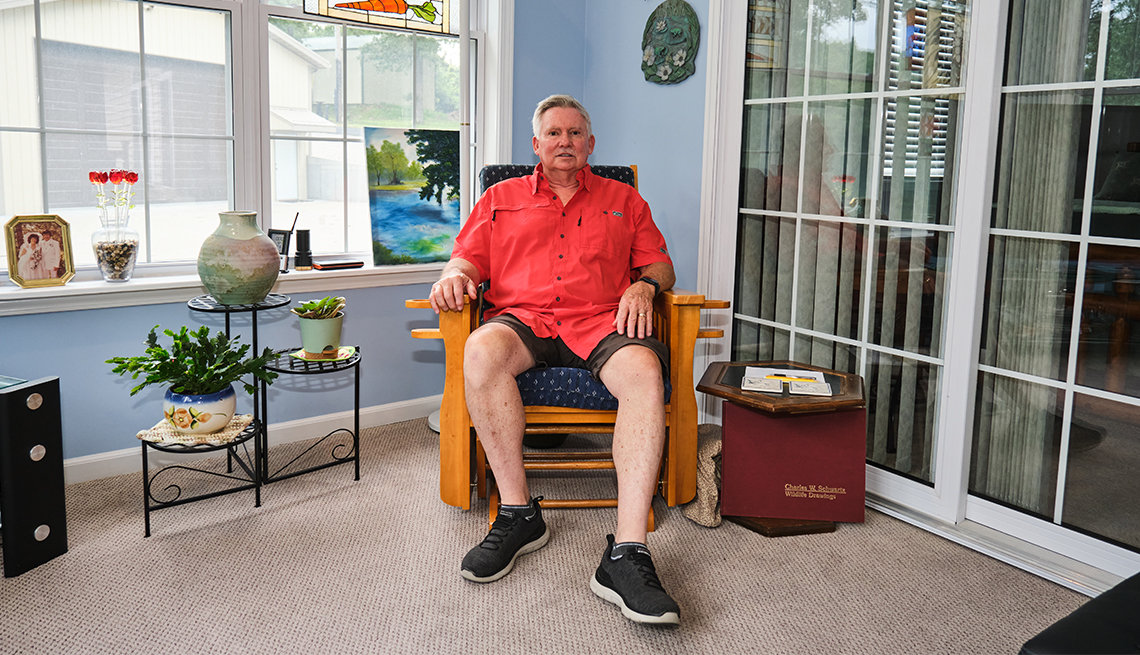AARP Eye Center
Closing the Digital Divide in Missouri
Fed up with sluggish and unreliable internet service, Joe Harvey went door-to-door to gauge neighbors’ interest in bringing broadband to their small lake community in southern Missouri.
“To me, it’s like not having the post office to deliver your mail,” says Harvey, 73, a retired postal operations analyst who lives near Warsaw. He wants the option to buy the sort of high-speed internet coverage most of America now takes for granted.
Missouri is in the last leg of a major push by the government, private companies and nonprofits, including AARP, to extend broadband access to every state resident.
With a historic amount of funds earmarked for broadband, Missouri has a once-in-a-lifetime opportunity to bring everyone up to speed, Gov. Mike Parson (R) told the Bulletin in April. Parson has long championed broadband expansion — especially for unserved or underserved rural areas.
“If all goes well, we should close the digital divide in our state totally in five years’ time,” he says.
Missouri has allocated $261 million of its American Rescue Plan Act funding for broadband efforts. And, last year, the federal Broadband Equity, Access and Deployment Program awarded the state an additional $1.7 billion — the biggest public investment of its kind in Missouri to date.
The Federal Communications Commission sets the minimum speed for fixed broadband at 100 megabits per second for downloading and 20 for uploading. The state’s broadband map, at broadbandmap.mo.gov, shows how coverage varies across Missouri.
Among states receiving the new federal funding for broadband expansion, Missouri received the third-highest amount, with Texas and California receiving the most.
The amount of funding indicates the level of work needed to make access universal, says BJ Tanksley, director of Missouri’s broadband development office.
Tanksley predicts the federal dollars will cover the remaining 200,000 unserved and underserved businesses and homes not yet funded by other sources. The southern part of the state — less populated, heavily timbered and home to the Ozark Mountains — will benefit the most.
Internet providers, including large communications companies, nonprofit electric and telephone cooperatives and municipal-owned networks, can begin applying for money this month.
Funding is scheduled to begin this fall, with work expected to be completed by the end of 2028.
Aaron Bradshaw, CEO of Tipton-based Co-Mo Electric Cooperative, compares the expansion to the spread of electric service in rural America in the 1930s and 1940s. Sparse populations and relatively low profit potential led to the creation of nonprofit electric co-ops — with the help of funding under the New Deal — to get the job done.
Founded in 1939, Co-Mo launched a communications subsidiary in 2010 to provide fiber optic internet, TV and phone service.

“We had people that lived in rural communities who would have to drive into town to the McDonald’s to download their school assignments or upload something,” Bradshaw says.
Reliable service
A University of Missouri survey and about 40 listening sessions held by the state in 2022 and 2023 show Missourians depend on the internet for daily life, from shopping and banking to entertainment and social media.
With rural health care provider offices closing, many AARP members have turned to virtual visits, which require a fast connection, says Jay Hardenbrook, advocacy director for AARP Missouri.
High-speed internet also provides an easy way to keep in touch with family and friends, Hardenbrook adds.
In his lakeside community, Harvey helped garner enough interest to attract a provider. Work laying fiber begins this month.
Once connected, Harvey’s download speed will jump from 6 megabits per second to 1 gigabit. In non-tech terms, that’s like flying compared to walking.
“Reliability is what we’re really after here,” he says. ■
____
People Need Tech Skills, Affordable Devices
Expanding broadband service to all residents is only part of Missouri’s internet challenge.
The state also plans to devote $14 million in federal Digital Equity Act funding to ensure that when Missourians do get high-speed service, they have the technology and necessary skills to fully engage in the digital world, says BJ Tanksley, head of the state broadband office.
Much of the money — which is expected to grow to $20 million in coming years—will be used for skills training, including understanding cybersecurity, setting up passwords and using the internet in general, Tanksley says.
“Some people take that for granted, but to the people that have not been living and working in this world, it can be a hurdle,” he says.
The funding also will help with device affordability, mostly through recycling and refurbishing computers for low-income users.
A 2023 University of Missouri survey of more than 7,500 Missouri households found that people were interested in digital training on a variety of topics — from finding trusted sources of information and accessing health care resources to managing and paying bills and gaining new job skills.
The state will largely work with schools, libraries and nonprofits on the effort, Tanksley says. The program is expected to launch this fall.
Sarah Hollander, a freelance writer and former daily newspaper reporter in Cleveland, has written for the Bulletin for 15 years.
More on Broadband
How to Find a Cheap Internet Plan
Time Runs Out on Federal Broadband Program
New Resource Helps States Improve Internet Access


























































